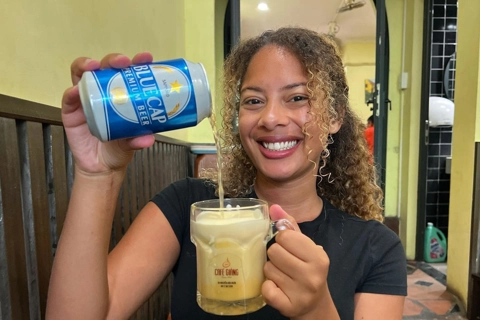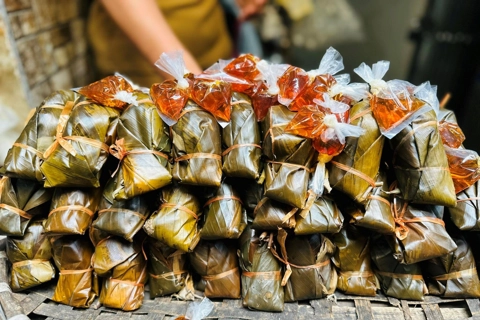Meet the ‘encyclopedia’ of martial arts who favors Monkey Kung Fu
Amongst more than 15 different kung fu styles the Vietnamese martial arts master has learned so far, Nguyen Van Anh lists Monkey Kung Fu, or Monkey Fist, as his favorite thanks to its flexible yet effective fighting techniques.
Anh, also known as Master Ngoc Anh, spoke to Tuoi Tre (Youth) newspaper in his hometown of Hue, where he explained why Monkey Kung Fu, or Hou Quan, appeals to him.
Hou Quan utilizes ape or monkey-like movements as part of its technique, which Master Ngoc Anh said are based on the principle of “using a gentle way to beat a stronger opponent.”
“The techniques look as if you are teasing your opponents, but they are effective attacks,” the 66-year-old said.
Unlike other animals that use their strength and large body shapes to intimidate opponents, monkeys make use of their speed and flexibility to counter-attack, principles that Hou Quan uses to develop its movements and techniques.
As seeing is believing, the kung fu master took the Tuoi Trecorrespondents to a plot of land south of the Imperial City of Hue, and performed several techniques to illustrate what he had explained.
He jumped, crouched, ran, turned around, and pretended to fall in flexible and smooth movements, using his hands, knees, legs and even shoulders to carry out eye-catching and continuous attacks.
Ngoc Anh first learned of Monkey Fist in 1979, when he saw a young practitioner of the Hung Kuen martial art, belonging to the Shaolin family of martial arts from China, performing the techniques during a kung fu ceremony in Hue.
He quickly idolized and connected with the young kung fu artist, and together they co-founded Vietnam’s Hou Quan sect in 1980.
The Vietnamese variant of the ‘monkey kickboxing’ is said to be much different from other independently developed systems of the martial art, in the way that it utilizes not only the movements but also the thinking, breathing and mentality of the monkey, Master Ngoc Anh explained.
“The principles are that while you keep moving in the outside, your inner side remains peaceful; and that your muscles are not tensed, while your mind is at ease and relaxed,” he elaborated.
“Practicing Vietnam’s Hou Quan will make you healthy both mentally and physically.”
In August 2015, Ngoc Anh was bestowed the title of International Master by the World Federation of Vietnam Vocotruyen (WFVV), the governing body of Vietnam’s traditional martial arts.
He was the first Vietnamese to receive the prestigious title, as the WFVV sought to honor his outstanding contribution to the promotion, conservation and development of traditional Vietnamese martial arts.
The martial art master, born in 1950, is also known as an ‘encyclopedia of kung fu’ as he has spent over fifty years learning more than 15 martial arts.
Master Ngoc Anh dedicated part of his talk with Tuoi Tre to recalling how and why he had devoted his life to kung fu from a very early age.
It all began in early 1960s, when Ngoc Anh was still a little boy who happened to watch 'Sanshiro Sugata,' one of Japan’s classic kung fu movies.
Ngoc Anh soon idolized the protagonist, Sugata, who was never defeated by any of his opponents.
In 1963, at the age of 13, Master Ngoc Anh sought his parents’ permission to start learning judo, and later, taekwondo. Years later, he continued practicing Vietnamese traditional martial arts with a seasoned master.
However, in 1973, Ngoc Anh became exhausted both mentally and physically. This was due to his over-practicing of multiple martial arts at one time, some family affairs and pressure from pursuing his higher education, as he was also then a senior chemistry student at the Hue University of Sciences.
Master Ngoc Anh has been pursuing martial arts for more than 50 years, and with every kung fu style he comes across, he has devoted his effort to ultimately mastering its techniques.
Still, the kung fu master said he will continue learning if any new traditional martial art captures his interest.
But what upsets Ngoc Anh the most is that Vietnam’s traditional arts are on the verge of disappearing, partly because of the concept that a kung fu sect must not be taught to outsiders.
“It is like one tree should only bear one fruit,” he said.
“The father will teach the martial art to his son and no one else can join in the learning, which is gradually ‘killing’ Vietnam’s traditional martial arts.”
Master Ngoc Anh is trying his best to make a change, as he is now the deputy general secretary of the Federation of Vietnamese Traditional Martial Arts, and chairman of the Hue Association of Vietnamese Traditional Martial Arts.
“I have repeatedly called for central-level solutions for saving Vietnam’s martial arts,” he said.
Ngoc Anh has suggested setting up an institute to transform Vietnam’s traditional kung fu into modern martial arts, and make them “a national sport which both local and international people can practice.”
The kung fu master has himself set up a martial arts library and has a collection of ancient weapons used in traditional kung fu.
“Traditional martial arts are one of Vietnam’s priceless resources and our intangible legacies that our ancestors built up for thousands of years and left for our generation,” he said.
“The loss of these martial arts would be therefore a huge waste, and disrespectful to our ancestors.”











